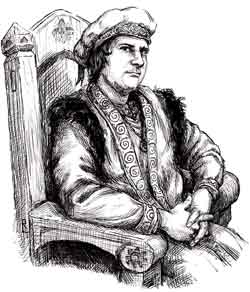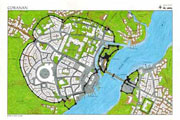 Thardic Lifepaths
Thardic Lifepaths
Despite Tharda's non-feudal social and political culture, the Lifepaths of Man section from Burning Wheel Gold, works very well for burning up Thardic characters.
Most of the Lifepaths of Man settings and subsettings (Peasant, Villager, City Dweller, Servitude, Outcast, Professional Soldier, Religious, etc.) can be used for ordinary Thardans, without any changes.
Creating characters who belong to Tharda's patrician elite, however, may require some variations to the lifepaths and settings found in the Lifepaths of Man.
Patrician Lifepaths Using Burning Wheel Gold
Legally speaking, Tharda's patricians are just (very) wealthy freemen. In practice, however, they are a ruling oligarchy that is comparable to the nobility in other southern Hârnic kingdom, but without the feudal obligations.
Consequently, the lifepaths outlined in the Noble setting and the Noble Court sub-setting from BWG's Lifepaths of Man can be used to create Thardic patricians, with only a few minor tweaks. There are also some lifepaths from the Villager and City Dweller settings that are also appropriate.
Noble Setting:
The Born Noble lifepath is the most appropriate first lifepath for a Thardic patrician. (The Your Lordship, Your Eminence, and Your Grace traits can be ignored.)
Noble (and Noble Court) lifepaths that are military in nature (Squire, Knight, etc.) represent time as an officer/horseman in one of Tharda's legions or Coranan's Red Guard). The Sworn Homage trait normally required for the Knight lifepath should be replaced by the new Legion Service trait (see below).
The lifepaths of Lord, Baron, Viscount, Count, and Duke are not appropriate in Tharda, and should not be taken. Alternately, at GM/group discretion, these lifepaths may be taken to represent time spent holding political office (as a legar, magistrate, or senator, for instance), or as a wealthy landholder or patrician clanhead. The Noblesse Oblige trait normally required for these lifepaths would be replaced by the new Corrupt trait (see below).
Noble Court Sub-Setting:
Many lifepaths from the Noble Court sub-setting are appropriate for Thardic patricians. Most of these would represent time spent at the villa or town home of one of Tharda's greatclans, at the palace of a provincial magistrate or marshall (or maybe even a district legar), or in service to the Senate itself. Others (e.g. Justiciar, Constable, Treasurer, Coroner, Advisor to the Court) might represent time spent holding political offices within the republic, such as legar, district commander, magistrate, marshall, and even senator.
As with the Noble Setting, the Noble Court lifepaths of Squire and Knight would represent time as an officer/horseman in one of Tharda's legions. The Sworn Homage trait normally required for the Knight lifepath would be replaced by the new Legion Service trait (see below).
Villager / City Dweller Settings:
Some Villager and City Dweller lifepaths would be appropriate for Thardic patricians who hold political office within the Republic. Examples include: Tax Collector, Town Official, Guard Captain, Dilettante, Judge, and Municipal Minister.
At GM/group discretion, some flexibility can be given regarding the leads listed the Lifepaths of Man.
Thardic Lifepath Traits
The following traits are referenced above:
| Corrupt | Dt | Lifepath Trait |
The character has gained a fondness for bribes, gifts, and favors. +1D advantage to any attempt to bribe the character. |
||
| Legion Service | Dt | Lifepath Trait |
Legion service has provided the character lasting social connections. This provides a +1D affiliation with one of Tharda's legions (or the Red Guard). |
||
 There are no nobles or serfs in Tharda. Officially, Thardic law recognizes
only two classes: citizens and slaves. In practice, a few dozen wealthy
greatclans (collectively referred to as 'patricians') hold a monopoly
on political power.
There are no nobles or serfs in Tharda. Officially, Thardic law recognizes
only two classes: citizens and slaves. In practice, a few dozen wealthy
greatclans (collectively referred to as 'patricians') hold a monopoly
on political power. 